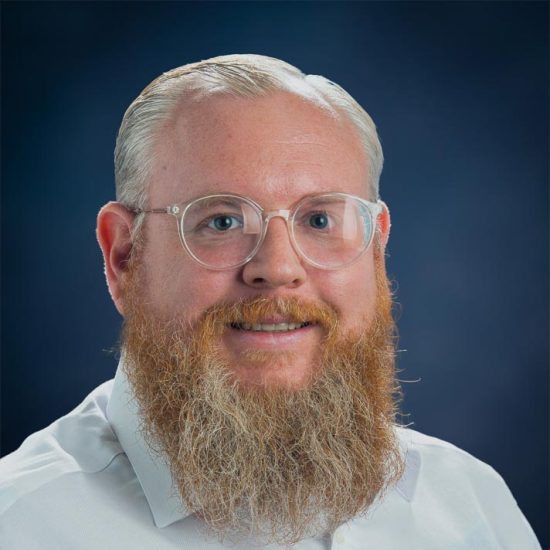Charles Woods, Ph.D. Assistant Professor/English (MS/MA) Program Coordinator
- Faculty

Dr. Charles Woods is originally from Birmingham, Alabama. Now, he lives in Rockwall with his wife, kids and dogs. Dr. Woods has a liberal arts background, having attained his degrees at the University of Montevallo. One of the reasons he loves working at East Texas A&M is because its student body and rural setting remind him of his undergraduate experience.
Dr. Woods is the first two-time winner of both the Kairos John Lovas Award and the Computers & Composition Michelle Kendrick Award. You can listen to Woods’ award-winning academic podcast, The Big Rhetorical Podcast.
A Conversation With Dr. Charles Woods
What would you tell a student who is thinking about attending East Texas A&M?
Prospective students should know that East Texas A&M is committed to cutting-edge research that benefits students in both urban and rural settings. For example, the Department of Literature and Languages has faculty with a variety of expertise working in different areas such as computational linguistics, digital rhetorics, surveillance studies and film and adaptation studies. I work with undergraduate and graduate students in classes like Professional Writing, Writing with Digital Media and Privacy and Surveillance Rhetorics to help them get ready to return to their hometown in East Texas, go to work in the Dallas-Fort Worth Metroplex, or make a difference in the world beyond Texas.
What draws you to your discipline?
My discipline is English, my field is rhetoric and composition and my specialization is digital rhetorics. I was drawn to my discipline as a child due to my love of reading and writing. I would read everything, and soon chapter books turned into novels, which in turn became movies, games, television shows, more novels, and, of course, technology and culture. As I grew older, I found ways to merge my interests in the Humanities with interests in technology and culture through my teaching and research. The world needs scholars who take Humanist approaches to interpreting and understanding the world, whether it is a piece of classic literature, an emerging technology, or the latest cultural phenomenon. So, I study data privacy and digital surveillance in my field of rhetoric and composition, which is very exciting considering developments in Artificial Intelligence.
What has been your favorite course to teach?
My favorite course to teach has been Writing with Digital Media. This course is a practicum on composing original essays with digital media, including video, sound and images. It is designed for advanced students and those new to writing with digital tools. It introduces students to a range of tools, concepts and models for composing with digital media, as well as ethical considerations associated with the creation and sharing of multimodal texts. In my class, students played around with different technologies to produce digital artifacts, including Adobe Photoshop, Illustrator and Audition. We used two books throughout the term to guide us through soundwriting projects and, together, published the Becoming a Soundwriter Network. The Becoming a Soundwriter Network was a great way for students to demonstrate their technological capabilities and to meet course outcomes for writing with different digital media. It also created something public-facing for the community and allowed students to build their portfolio. Plus, the soundwriting projects were outstanding!
Tell us about a research project you are currently working on or recently completed.
I must tell you about my research on the Digital Rhetorical Privacy Collective (DRPC) Privacy Week! I articulated the DRPC in my dissertation, and once I began working as a professor, I organized an Advisory Board and founded the project. The DRPC is an interactive, coalitional resource that hosts events and features reading lists, activities, assignments, lesson plans and other teaching materials for teaching about data privacy and digital surveillance. The DRPC's mission is to bridge scholarly and public conversations about surveillance and privacy to enact coalitional action dedicated to not only to ending oppression under surveillance capitalism but also to building an equitable future for all. So far, the DRPC has won 3 research grants, including funding from the ETAMU Presidential GAR Initiative, the Council for Programs in Technical and Scientific Communication (CPTSC), and the National Council of Teachers of English/Conference on College Composition and Communication (CCCC) to produce DRPC Privacy Week. Privacy Week was a week-long, interinstitutional event featuring scholars from 14 universities performing workshops, discussion panels and keynote lectures about privacy and surveillance. The DRPC was awarded the 2024 John Lovas Award and the 2024 Michelle Kendrick Outstanding Digital Production Scholarship Award for Privacy Week. You can watch Privacy Week events on our website.
Educational Background
- Ph.D., English Studies, Illinois State University, 2021
- M.A., English, University of Montevallo, 2012
- B.A., English, University of Montevallo, 2010
Academic Experience
- Assistant Professor, English, Literature and Language, East Texas A&M University
- Teaching Assistant Professor, East Carolina University
Awards and Honors
- John Lovas Award, Kairos: A Journal of Rhetoric, Technology, and Pedagogy., 2024
- Michelle Kendrick Outstanding Digital Production Scholarship Award, Computers & Composition., 2024
- Faculty Senate Award for Professional Excellence in Teaching with Technology, A&M-Commerce.(now East Texas A&M), 2023-2024
- John Lovas Award, Kairos: A Journal of Rhetoric, Technology, and Pedagogy., 2022
- Michelle Kendrick Outstanding Digital Production Scholarship Award, Computers & Composition., 2022
Research Interests
- Surveillance Studies
- Digital Rhetoric
- Technical Communication


